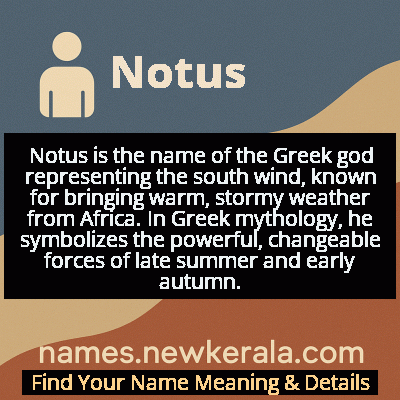Notus Name Meaning & Details
Origin, Popularity, Numerology Analysis & Name Meaning of Notus
Discover the origin, meaning, and cultural significance of the name NOTUS. Delve into its historical roots and explore the lasting impact it has had on communities and traditions.
Name
Notus
Gender
Male
Origin
Greek
Lucky Number
8
Meaning of the Name - Notus
Notus is the name of the Greek god representing the south wind, known for bringing warm, stormy weather from Africa. In Greek mythology, he symbolizes the powerful, changeable forces of late summer and early autumn.
Notus - Complete Numerology Analysis
Your Numerology Number
Based on Pythagorean Numerology System
Ruling Planet
Saturn
Positive Nature
Ambitious, efficient, realistic, and authoritative.
Negative Traits
Materialistic, stressed, confrontational, and can be overly ambitious.
Lucky Colours
Dark blue, black.
Lucky Days
Saturday.
Lucky Stones
Blue sapphire, amethyst.
Harmony Numbers
2, 4, 6.
Best Suited Professions
Business leaders, managers, financial services, law enforcement.
What People Like About You
Leadership, determination, organizational skills.
Famous People Named Notus
Notus (Mythological)
Greek God
One of the four Anemoi (wind gods), ruler of the south wind bringing summer storms and late summer heat
Notus of Alexandria
Ancient Scholar
Recorded early meteorological observations of Mediterranean wind patterns and their seasonal effects
Notus Petrakis
Modern Poet
Award-winning Greek poet who incorporated mythological themes into contemporary verse
Name Variations & International Equivalents
Click on blue names to explore their detailed meanings. Gray names with will be available soon.
Cultural & Historical Significance
In artistic and literary traditions, Notus was frequently depicted in relation to his seasonal associations. He was often shown as a mature, bearded figure carrying a water jar, symbolizing the rain-bearing capacity of the south wind. The Roman adaptation as Auster maintained similar characteristics but sometimes emphasized the more dangerous aspects of the wind, including its association with fog and sudden squalls. The cultural understanding of Notus reflected the ancient Mediterranean world's deep connection to natural cycles and their personification of environmental forces that directly impacted survival and prosperity.
Extended Personality Analysis
Those bearing the name Notus are often characterized by their intense emotional nature and dynamic personality, mirroring the powerful, changeable qualities of the south wind. They typically possess a warm, engaging presence that draws people to them, combined with a passionate intensity that can manifest as either creative inspiration or sudden emotional outbursts. Like their namesake wind, they may experience rapid shifts in mood and energy, moving from calm contemplation to vigorous action with little transition. This emotional volatility, while challenging, often fuels their creativity and drive.
Individuals named Notus tend to be natural leaders with strong persuasive abilities and a magnetic charisma that makes them effective in influencing others. They're often drawn to creative or dramatic pursuits where their emotional depth and expressive nature can be channeled productively. However, they may need to develop emotional regulation skills to prevent their passionate nature from becoming overwhelming. Their loyalty to loved ones is typically fierce and unwavering, though they can be equally intense in their disagreements. The name suggests someone who brings both warmth and intensity to relationships and endeavors, capable of great nurturing support but also formidable opposition when circumstances demand.
Modern Usage & Popularity
In contemporary naming practices, Notus remains an extremely uncommon choice, primarily favored by classical scholars, mythology enthusiasts, and parents seeking distinctive names with deep historical roots. Its usage is almost exclusively limited to Greece and academic circles, with occasional appearances in other countries among families with strong classical education backgrounds. The name has never appeared on popular baby name charts and maintains an elite, intellectual aura that prevents widespread adoption. However, with the recent resurgence of mythological names in popular culture through books, films, and television series featuring Greek mythology, there has been a slight increase in awareness and potential usage of previously obscure mythological names like Notus. Its masculine, powerful sound and unique heritage make it appealing to parents looking for names that are both meaningful and distinctive.
Symbolic & Spiritual Meanings
Symbolically, Notus represents the powerful, transformative forces of nature that are both creative and destructive. As the south wind, it embodies the transition between seasons—specifically the movement from the stable warmth of summer to the volatile storms of approaching autumn. This makes it a symbol of change, transformation, and the necessary destruction that precedes renewal. The warm, moisture-laden winds of Notus symbolize emotional depth, passion, and the fertile ground from which new beginnings can emerge after the storm has passed. Metaphorically, the name suggests someone who brings both comfort and challenge, capable of nurturing growth through their warmth but also clearing away the old through their intensity. It represents the idea that true strength often comes from embracing one's passionate nature while learning to direct that energy constructively.

